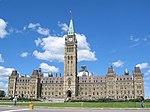National Resources Mobilization Act
| National Resources Mobilization Act, 1940 | |
|---|---|
 |
|
| An Act to confer certain powers on the Governor in Council for the mobilization of resources in the present war | |
| Citation | 4 George VI, Chap. 13 |
| Enacted by | Parliament of Canada |
| Date assented to | June 21, 1940 |
The National Resources Mobilization Act, 1940 (4 George VI, Chap. 13) was a statute of the Parliament of Canada passed to provide for better planning of a much greater Canadian war effort, both overseas and in military production at home.
Modelled on the British Emergency Powers (Defence) Act 1939, as amended in 1940, it gave the Canadian government the power to
do and authorize such acts and things, and make from time to time such orders and regulations, requiring persons to place themselves, their services and their property at the disposal of His Majesty in right of Canada, as may be deemed necessary or expedient for securing the public safety, the defence of Canada, the maintenance of public order, or the efficient prosecution of the war, or for maintaining supplies or services essential to the life of the community.
This was the basis of all organization for Canada's war production.
In order to prepare the population for military service, provision was made under the Act for:
The Act was also used to ensure greater efficiency that was required in a wartime economy by:
The Act permitted conscripts (known as "R men" or "zombies") to be used for home defence only and not to be deployed overseas. The "Zombies" were so-called because they were soldiers who could not fight overseas in the war, making them like the zombies of Haitian mythology who were neither dead nor alive, but rather somewhere in-between. In 1942, the Act was amended to remove the prohibition on conscripts serving outside Canada, and the first overseas campaign that NRMA recruits were subsequently involved in was the recapture of the island of Kiska in August 1943. Until November 1944, only those Canadians who had volunteered were sent elsewhere overseas.
The rule prohibiting "Zombies" from being sent to fight overseas was modified after a plebiscite was held on the matter on 27 April 1942 where the majority of people in the 8 English-speaking provinces voted to release Prime Minister William Lyon Mackenzie King from his promise not to send the Zombies overseas. By contrast, Quebec voted by a large majority against oversees conscription in the referendum. As Quebec was the one province that Mackenzie King really wanted to vote yes in the plebiscite, Quebec's non vote placed the prime minister in the dilemma of honoring the wishes of the majority of English Canada vs. alienating the wishes of majority in French Canada. Such an order, authorizing the transfer of 16,000 conscripts to England, was not made until November 1944. This precipitated the Conscription Crisis of 1944, and resulted in several Quebec Liberal MPs leaving the party in protest. 9,667 NRMA recruits were sent to England, of which two-thirds only arrived after V-E Day.
...
Wikipedia
